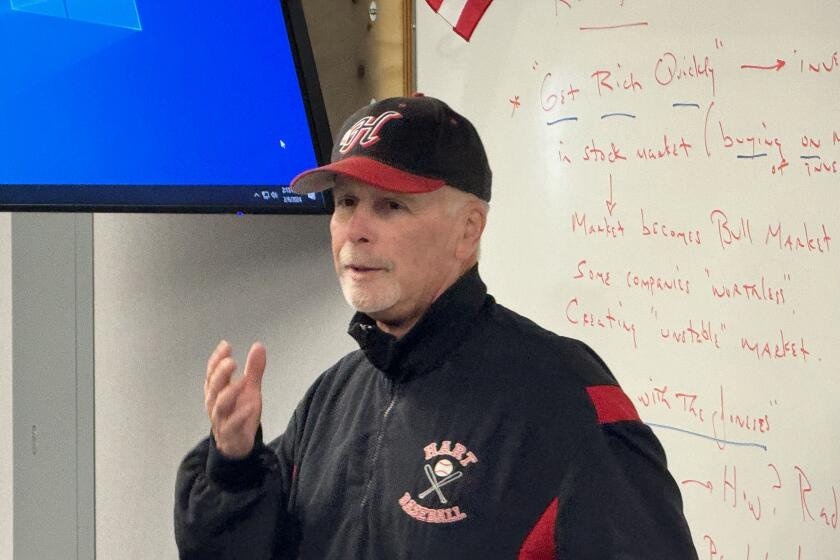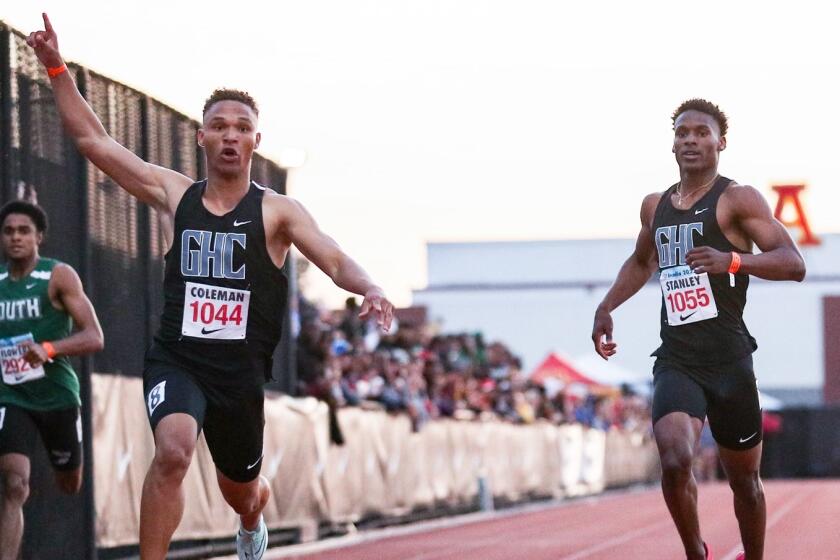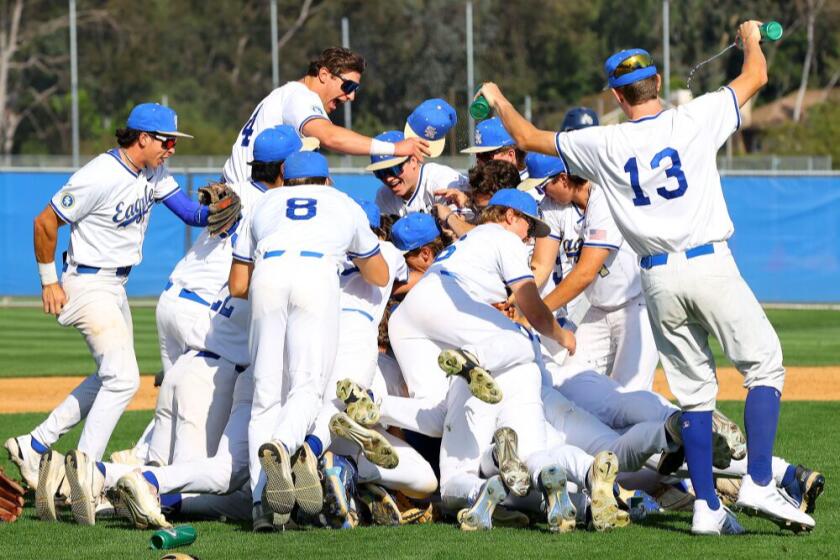On court and off, he made them winners
He is frail now. The years have taken their toll on legs that once pounded and paced the sidelines of Fairfax High’s gleaming basketball court. On a recent Sunday, the slight Jewish man in the red wind-breaker and baseball cap reading “Coach” shuffled with a cane into Canter’s Delicatessen.
Marty Biegel, 86, was heading for a table across the room, and when he got there a group of tall black men rose to cheer:
Biegel, the father figure who helped raise them.
Biegel, the wizard who turned them into champions.
Biegel, the bridge-builder between blacks and whites.
“What’s up, Mr. B?” they said one after another, lining up to give him bear hugs.
“You’re looking good, fellas,” Marty shot back, beaming up at them. “What the hell happened to your Afros?”
Once again, Marty Biegel was back with his boys.
A story that began in angry debates over school desegregation in Los Angeles continues as a love affair today, between a teacher and the players whose lives he changed.
Nearly 40 years ago, in 1969, Biegel took over the basketball coaching job at Fairfax High School. He was a pint-sized scrapper from New York, a history teacher with a heart of gold and no illusions about his new post: The mostly white, Jewish school near Hollywood was strong academically, but pitiful in sports. The chess team won medals. The football players? Don’t ask.
Then Biegel got a gift -- a product of good timing, an earthquake and decades of agitation for civil rights.
In 1968, school district boundaries were redrawn, allowing black students living south of Pico Boulevard to attend the school at Melrose and Fairfax avenues. Its numbers grew from 35 to 1,000 in four years, and Fairfax became one of the few city schools to achieve racial balance on its own, without a court order.
Much of Los Angeles fretted when blacks began appearing in white schools during the 1970s. Not Biegel.
He celebrated the new black athletes in his gym -- players who could go to the basket with either hand and leap high above the rim. An orthodox Jew, he’d look heavenward and murmur a prayer.
“We’re winners!” he would crow. “We can take anybody!”
Biegel’s Lions won four straight East Valley League championships, a record for Fairfax. But the charismatic coach couldn’t have done it -- or lived the life that ultimately defined him -- without the gifted black kids he recruited.
And those kids, now men, have never strayed far from his side.
They attended the funeral of his wife, Helen, in 1985 and sat shiva with him as he wept on his living room floor. Gathering around him in a protective circle, they held his hand and kissed his head. “It was very sad and quite moving,” said Ruth Herman, his sister.
Biegel in turn offered his players a shoulder to cry on when they were shattered by divorce, lost jobs or suffered other disappointments. He is godfather to many of their children.
But they share an even deeper bond. The coach and his players were unsung heroes as integration rocked Fairfax High. Their triumphs became a unifying force, a vivid symbol of change.
At Canter’s -- the site of one of their many get-togethers over the years -- Biegel, 5 feet 6, was embraced by six of the men he had coached as teens. They bent down one by one to hug him. He reached up to kiss each on the cheeks. They told stories about nail-biting games and miracle shots at the buzzer.
Biegel told stories too -- the same ones, three or four times -- but the men pretended not to notice.
“You’re all like sons to me,” the old coach said, his eyes welling up with tears. He pushed aside a plate of potato latkes. “You were my little boys back then. And you’re all such handsome men now.”
Born in 1922 on New York’s Lower East Side, Biegel was the oldest of four children. He was a good student and a free spirit. Sports were his passion. But his father wanted him to become a rabbi. To his parents’ dismay, he spent hours in a pool hall, rubbing shoulders with wiseguys.
“Marty always wanted to be different,” said Herman, his sister. “So he took his own course in life. He rooted for the Chicago Cubs while he lived in New York City. Who does that?”
Biegel won a baseball scholarship to the University of Colorado, then left college before graduation to join the Marines during World War II.
After marrying Helen Greenfield, his high school sweetheart, he moved to California. They raised two children.
As his teaching career began in 1955, Biegel’s heart was still on the playground. He coached kids’ basketball at the Westside Jewish Community Center. When the Lakers came west in 1960, he became a reserve NBA referee; he’d hustle down the court with Jerry West, Elgin Baylor, Bill Russell, Bob Cousy and other legends.
During the 1960s, he was a popular history teacher.
“The work was demanding, and you didn’t want to let him down,” said Los Angeles County Supervisor Zev Yaroslavsky, a former student. “We had debates about the Vietnam War that got intense.”
Biegel jumped at a chance to coach the school’s non-varsity hoops teams. But they struggled. Once, a hapless Fairfax player mistakenly shot the ball at the opposing team’s basket.
In 1969, the varsity coach left and Biegel got his job. Few expected the Fairfax squad to improve much. But more than the basketball team was about to change.
As the coach began looking for new talent, Fairfax began to integrate. Biegel knew he was dealing with a racially sensitive situation. The black kids he recruited were smart and ambitious. But few had interacted with white people.
“I’d sit them down and tell them we had to make this situation work,” Biegel said. “I told them if they broke any laws or used drugs, I’d throw them off the team. I also said I believed in them 100%.”
Biegel’s first black recruit was Chris Parker, whom he met at the Jewish Community Center. During a two-hour pitch in the boy’s kitchen, the coach pleaded with him to choose Fairfax.
“My mom said: ‘Wow, that little guy can talk!’ ” Parker recalled. “He told me the most important thing was that I had to become a good person. And that he, Marty Biegel, would guarantee this.”
Parker, who never knew his dad, was dumbfounded.
“How could you possibly deny this guy?” said Parker, now 53, and an actor. “He’s so small you could break him in half! But he locked me in with a deep soul look. He made me believe.”
Friction surfaced immediately. Biegel started Parker, a freshman, and white players who had waited for their shot at varsity felt cheated. Several threatened not to play.
Joe Gisis, a white player, persuaded them to back off.
“We couldn’t quit on Marty,” he said. “This guy was so far ahead of his time when it came to working with racial differences. We finally got it together as a team.”
Fairfax High suddenly began winning.
In its second full season with Biegel, the largely black team captured the 1971 East Valley League championship. The clinching victory against Grant High School was televised live -- and jubilant players carried Biegel off the court on their shoulders.
On the day the post-season began, Feb. 9, 1971, the San Fernando earthquake hit. But the main event for Biegel’s players came hours later: They beat Locke High in a playoff game, their school’s first post-season victory in decades.
The players were euphoric. Other schools were skeptical.
Who were these guys from Fairfax -- the black players out of nowhere, the little Jewish coach who yelled from the sidelines?
“A lot of teams would laugh at us when we walked onto the court,” said Steve Cantor, 54, one of the few white stars on Biegel’s teams. He arrived at Canter’s shortly after the reunion began. “They weren’t laughing when we walked off.”
Sometimes the mood got ugly. When Fairfax beat Manual Arts, a strong South-Central team, an angry crowd began rocking the team’s bus. The players had to wait in the locker room for police to arrive. Once, when the team played North Hollywood, jeering fans threw pennies at Biegel’s head, an anti-Semitic taunt.
The coach treated his players like family, inviting them over for blintzes and kishkes. He’d also drill them for hours.
“Marty never imposed a system,” said Tommy Hawkins, a former Laker and a Biegel friend. “He tapped into his players’ strengths.”
He also challenged them to perform miracles.
In a game against North Hollywood, Fairfax trailed by one point with two seconds to go. Biegel drew up the play: Cantor passes to Parker at the free throw line. Parker sinks the shot as time runs out.
When the pass came, Parker, 6 feet 5, was swarmed by defenders and tumbled to the floor as he took his shot. He couldn’t see the ball. Only when he heard the roar of Fairfax fans did he know it went in.
Then Biegel was all over him, hugging his neck.
On campus, emotions shifted from day to day: Some black kids bonded with hippies, who put flowers in their Afros. Two members of the Jackson 5 were enrolled, attracting huge crowds. But there were tensions.
Biegel’s black players remember rushing through the halls on their way to class, as white students clutched purses and wallets. When they walked on the streets of the Fairfax neighborhood, they heard car locks snapping shut. Police cars slowed passing by.
About the same time, black and Latino gang members began coming onto the school grounds.
“Assaults Plague Fairfax Campus” screamed a 1970 headline in the Colonial Gazette, the school paper. “Students have been extorted at knife point in the restrooms, while others have been brutally assaulted with no apparent provocation in front of apathetic crowds.”
The ground shifted again when the 1971 quake damaged nearby Los Angeles High, a mostly black school. Soon its entire student body was sent to Fairfax. The two schools shared the campus on a split-day schedule for the balance of the spring term.
Worlds were colliding. Some parents moved their kids to other schools. But Fairfax survived the turmoil.
“Give credit to both communities for making this work,” said Richard Battaglia, an English teacher and faculty chairman who went on to develop the Los Angeles Unified School District magnet program.
“Fairfax was the crucible for a lot of social upheaval. And even though some outside forces, like earthquakes, didn’t make it any easier, all of the people who came through it were the better for it.”
By 1975, nearly one-third of the school’s 3,000 students were black, with more arriving. Biegel’s tenure as coach ended. When he berated a referee after a game, the principal took his job away.
He returned to coaching three years later, winning another league championship. Then he retired from teaching in 1983. Biegel coached at Cal State L.A. and Malibu High School before calling it quits in 1997 at the age of 74.
“I had to slow down,” he said. “But if Fairfax High School called me back, if they asked me to return, I’d be there in a heartbeat.”
Today, Fairfax is one of the city’s most diverse campuses. Its basketball team is a powerhouse, winning two state championships in the last five years. Coach Harvey Kitani has run the program for 27 years.
But take it from John Wooden, UCLA’s legendary coach. Although Biegel never won a city championship, he and his teams began that winning tradition.
“Give him credit,” Wooden said in a telephone interview. “He knew you don’t win games just with talent. You have to bring people together.”
Nowadays, Biegel lives in a small, private room in a West Los Angeles assisted living facility. His walls are filled with faded black-and-white photos of teams he coached and players he loves.
He attends Fairfax games and is a popular figure at high school reunions. But he misses his family: His daughter lives in Israel and his son lives in the Bay Area. He enjoys the company of Janet Colman, the widow of a former student, who regularly looks in on him.
Biegel had a stroke two years ago, and his mile-a-minute speech has slowed. Last month he fell twice in his apartment, and he’s forgetting events from day to day.
But some memories and emotions remain clear. Every night, he recites a prayer for family and friends and for Jewish war veterans. Then he says a special prayer for his players.
During their lunch at Canter’s, Biegel told his players he had a photo of them at his wife’s 60th birthday. Two years later, she died. The players remember her funeral vividly: Especially when the rabbi made a small tear in Biegel’s lapel, a Jewish mourning ritual.
None of them had ever been to a Jewish funeral, and they had to be restrained from manhandling the rabbi. “Somebody’s tearing coach’s clothes!” Parker said. “Get him away from the coach!”
Biegel profoundly changed their lives, the players agreed. They wouldn’t be the men they are today without him.
“Marty taught me about tolerance,” said former guard Kevin Barrett, 53, director of film preservation for 20th Century Fox.
“What we went through, the rest of America should go through,” Cantor said. His comment drew emphatic nods from Darryl Brooks, Ed Dickerson and Conrad Lewis, the other players at the gathering.
As the meal ended, waiters began clearing the table. Biegel struggled to his feet, wanting to say a final goodbye.
“Please, guys, stay in touch,” the coach said. “I never want to lose touch with you. I want to see your sons play basketball.”
His voice began to shake.
“You gave me the very best years of my life.”
One by one the players said goodbye. Then Biegel shuffled out of the restaurant, clutching his cane and the memories of another visit.
--
Get our high school sports newsletter
Prep Rally is devoted to the SoCal high school sports experience, bringing you scores, stories and a behind-the-scenes look at what makes prep sports so popular.
You may occasionally receive promotional content from the Los Angeles Times.



